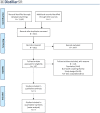Diabetes health coach in individuals with type 2 diabetes: A systematic review and meta analysis of quadruple aim outcomes
- PMID: 36589795
- PMCID: PMC9800616
- DOI: 10.3389/fendo.2022.1069401
Diabetes health coach in individuals with type 2 diabetes: A systematic review and meta analysis of quadruple aim outcomes
Abstract
Background: As diabetes self-management necessitates life-long learning, behaviour change, support, and monitoring, health coaching is a promising intervention to assist individuals in more than just meeting glycemic goals and glycated hemoglobin (A1C) targets. Currently, studies of health coaching for type 2 diabetes (T2DM) are limited due to their emphasis on glycemic control. The goal of this systematic review and meta-analysis is to determine the effects of health coaching on adults with T2DM based on quadruple aim outcomes and to assess the implementation of these interventions.
Methods: We searched 6 databases for randomized controlled trials of health coaching interventions delivered by a health professional for adults with T2DM. Reviewers screened citations, extracted data, and assessed risk of bias and certainty of evidence (GRADE). We assessed statistical and methodological heterogeneity and performed a meta-analysis of studies.
Results: Nine studies were included in this review. Our meta-analysis showed a significant reduction of A1C [0.24 (95% CI, -0.38 to -0.09)] after exposure to diabetes health coaching, and small to trivial significant benefits for BMI, waist circumference, body weight, and depression/distress immediately post intervention based on moderate certainty of evidence. However, long term benefit of these clinical outcomes were not maintained at follow-up timepoints. There was a small significant benefit for systolic blood pressure which was maintained after the completion of health coaching exposure at follow-up, but there was no statistically significant benefit in other secondary outcomes such as diastolic blood pressure and lipid profile measures (e.g. triglycerides). Very few studies reported on other quadruple aim measures such as patient-reported outcomes, cost of care, and healthcare provider experience.
Conclusions: Our systematic review and meta-analysis shows that health coaching interventions can have short term impact beyond glucose control on cardiometabolic and mental health outcomes. Future studies should try to examine quadruple aim outcomes to better assess the benefit and impact of these interventions at longer time points and following termination of the coaching program.
Systematic review registration: https://www.crd.york.ac.uk/prospero, identifier (CRD42022347478).
Keywords: health coaching; meta analysis; quadruple aim; systematic reveiw; type 2 diabetes.
Copyright © 2022 Racey, Jovkovic, Alliston, Ali and Sherifali.
Conflict of interest statement
The authors declare that the research was conducted in the absence of any commercial or financial relationships that could be construed as a potential conflict of interest.
Figures






References
-
- Diabetes around the world in 2021: IDF diabetes atlas (2021). Available at: https://diabetesatlas.org/.
Publication types
MeSH terms
Substances
LinkOut - more resources
Full Text Sources
Medical
Research Materials

